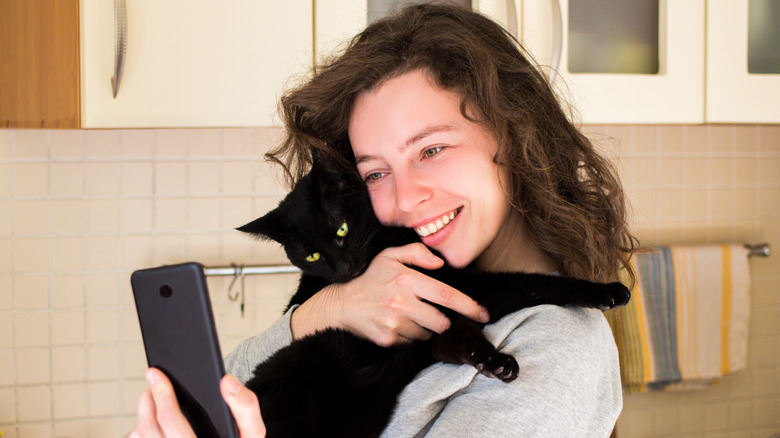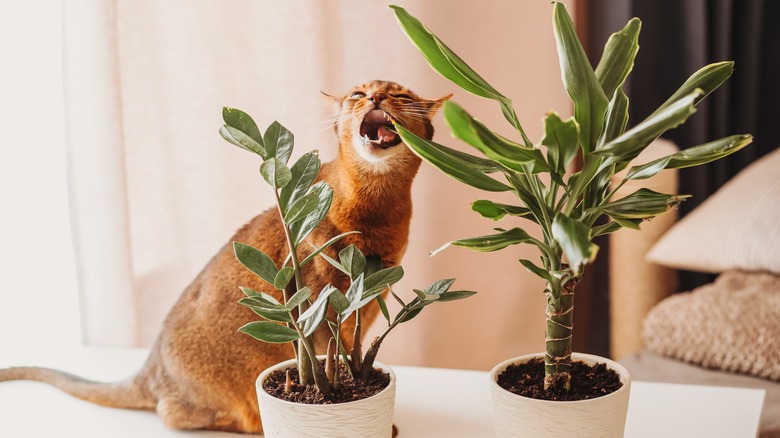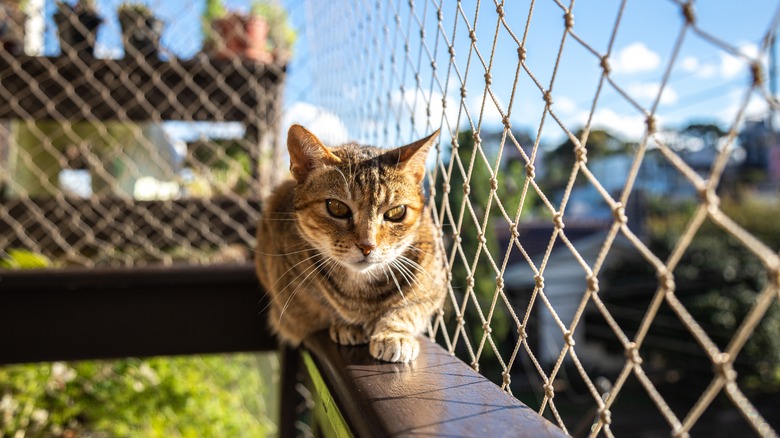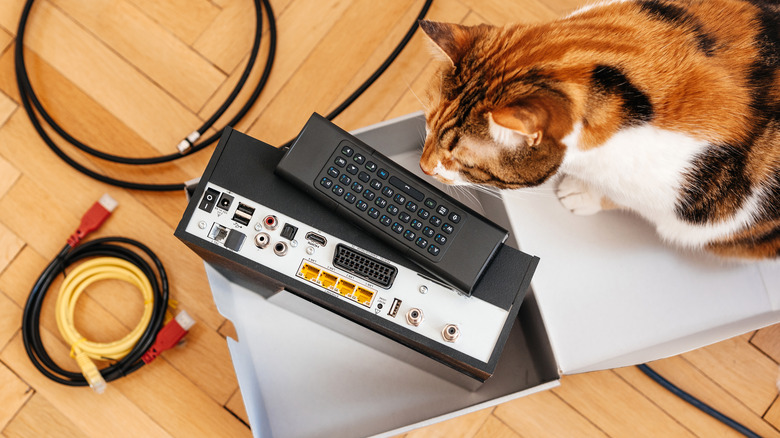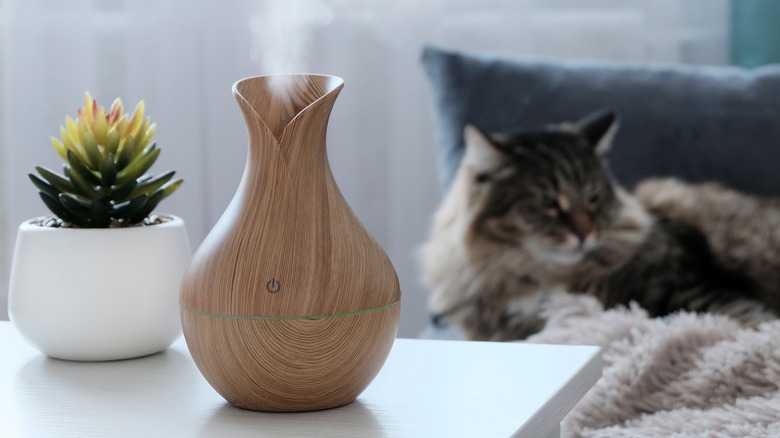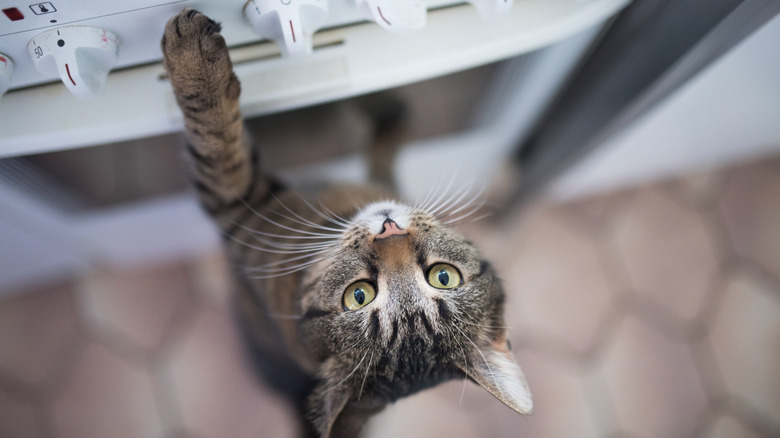5 Best Ways To Make Your Home Safer For Your Cat, According To An Expert
Cats can provide valuable human companionship while also working to catch a mouse or two, as noted by Lake City Humane Society, but anyone who plans to welcome a new kitty into their home needs to learn about their particular needs before doing so. Cats are notorious for getting into things and making their presence known. That's due in part to their quick reflexes and strong muscles, which give them the confidence to take on even big challenges. Their notoriously sharp teeth can cause a significant amount of damage, too, no matter if it's to your finger or an important document on your desk.
That's why it's critical to ensure your home is ready for a cat, and that often means making a few substantial changes to protect your cat from its own curiosity. "The first and one of the most important steps in catifying your apartment is cat-proofing," shares Dr. Paola Cuevas, a veterinarian, MVZ, and behaviorist with Hepper. In an exclusive interview with House Digest, she adds, "Cats are curious creatures and will investigate every little corner and climb every shelf and piece of furniture they can reach."
Ensure your household plants are safe
It's not uncommon for a cat to dig into a plant or bite at the leaves, which can prove problematic in several situations. Dr. Paola Cuevas states, "Make sure your houseplants are not listed as toxic to cats. Lilies (Lilium spp.), azaleas and rhododendrons (Rhododendron spp.), lily of the valley (Convallaria majalis), peace lily (Spathiphyllum spp.), amaryllis (Amaryllis spp.), tulip (Tulipa spp.), are just some examples of plants that are highly toxic to cats."
It's not enough to simply put these plants out of the reach of cats since many will climb from the tops of your kitchen cabinets to the highest shelf in your home. "Any plant you wish to keep in your apartment or balcony should be checked to guarantee your cat's safety," advises Cuevas. Checking your plants against the comprehensive list of toxic plants put together by the American Society for the Prevention of Cruelty to Animals (ASPCA) is certainly the best way to get true peace of mind.
Shore up windows and balconies
You may think cats are smart enough not to jump from locations that are so high they could get hurt, but that's not always the case. Think of your kitties, instead, as children you need to protect. "Make sure you cat-proof your windows and balcony. This is especially important in apartments that are higher up where a cat could suffer serious injury if it accidentally falls off the balcony or jumps off the windows," recommends Dr. Paola Cuevas.
This can be difficult because cats can slither through just about any size railing or scoot under small openings in the screen of a window to make their escape. "Placing mosquito nets over the windows and chicken wire around balconies will help to prevent such incidents," reveals Cuevas. Even if you don't plan to leave the balcony open for your cat to use, a single incident when the door doesn't close properly can put your cat at risk. On the other hand, creating a safe, enclosed space could be a good way to give your cat some much appreciated fresh air and sunshine.
Make sure your furnishings are safe
You probably don't think much about whether a beautiful glass vase is going to be a danger to your cat before you bring it home, but it's quite often high risk. Because of their nature, cats will likely investigate anything new you place on a table. "Remove any potential hazard, any crystal, ceramic, porcelain, or glass decoration that can be tipped over, broken, and represent an injury hazard," shares Dr. Paola Cuevas. That could mean you're putting away a great deal of the items you're using to decorate your home, yet, doing so is worthwhile.
"Cats are playful creatures; they are really attracted to string and ribbon-like structures, so please avoid leaving them within their reach," Cuevas notes, adding that electrical cords and charging cables are even more dangerous for your curious feline. A cat that nips at just one cable could suffer a life-threatening electrocution and create a fire risk in your home. "All cables should be out of their reach either by covering them, pasting them to the wall, or putting them away after every use," she says.
Decrease potential hazards
Cats will ingest things they find curious or bite-sized, even if doing so is a hazard to them. On this topic, Dr. Paola Cuevas says, "Avoid using candles, incense sticks, air fresheners, or scent diffusers. They represent a real threat to your kitty's health." Unfortunately, you really shouldn't use these even around the stinky litter box area. She continues, "From fire and injury to intoxication or the development of asthma or other respiratory issues, these items are simply not worth having around."
Most cats can jump from the floor to the countertop or table, which means anything displayed in these areas could be accessible. "Food, medicine, and household cleaning chemicals should be kept inside cabinets and away from your cat's reach at all times," suggests Cuevas. Even if you think you'll be able to keep an eye on the cat, remember that they're nocturnal animals. There's no way to protect them from climbing onto the kitchen island to see what you left behind if they're left to roam while you sleep.
Keep some rooms off-limits
It's hard to keep cats out of everything or to ensure that every single item in a room is going to be safe for their playful and curious minds. Dr. Paola Cuevas shares, "It is always recommended to keep the kitchen pantry a no cat allowed zone. This is best both for hygiene and safety reasons." No one wants to wake up to a bag of food torn open from a night of feline hunting.
Look for other potential hazards throughout your home. Here's one Cuevas recommends that you may not have considered. "As an additional precaution, you should have a stovetop cover to prevent your cat from getting burned or injured if they do jump to the stove right after you turned it off." Without a doubt, you'll want to keep cats out of areas with big risks, such as around hot water heaters, major appliances, and attic spaces. Taking a few steps like these can reduce some of your frustrations as a pet owner and help ensure you don't have to make too many repairs to your home or whisk your furry friend to the emergency animal hospital.
